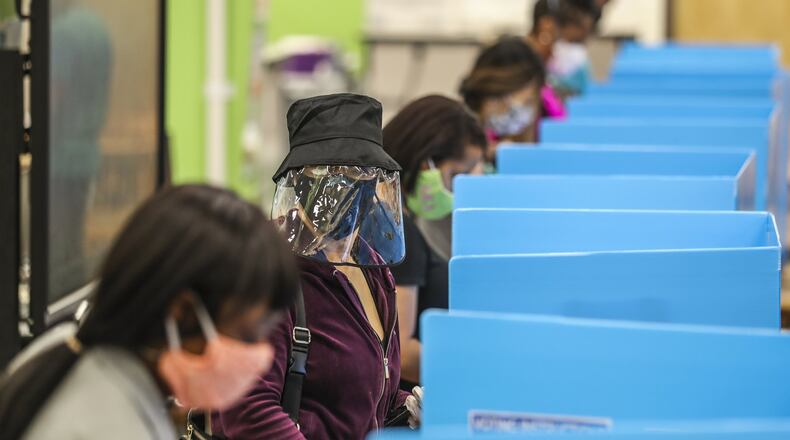DeKalb’s elections director said she’ll make more of an effort to cooperate with the nonprofit organization brought in to help optimize the county’s absentee ballot operations.
The National Vote at Home Institute — a group that consults with state and local elections officials across the country to help make absentee voting more accessible and efficient — was invited to work with DeKalb earlier this summer.
Like many large Georgia jurisdictions, the county struggled with the surge of absentee ballots submitted during June’s primary election, taking more than a week to finish processing them all.
The number of absentee ballots submitted in DeKalb and elsewhere is projected to grow significantly for November’s closely watched presidential election.
Vote at Home — which is also currently working with Fulton and Gwinnett counties — completed some initial work outlining DeKalb’s processing operations after being brought into the fold. Assessing how the county processes absentee ballots is a crucial first step before the group can make recommendations for improvement.
But representatives of the nonprofit said Wednesday that they effectively disengaged because they weren’t getting the support they needed from elections officials.
“A lack of access, a lack of information, a lack of communication make it really hard for an outside group to assist,” Vote at Home CEO Amber McReynolds said.
During a Wednesday afternoon meeting that included representatives from DeKalb’s Board of Commissioners, its elections board and its elections office, McReynolds and colleague Hillary Hall were quick to say that they were still willing to help and had not formally withdrawn from the county.
But, they said, requests for information like expected turnout had gone unanswered. And they hadn’t been given the in-person access they need to observe DeKalb’s absentee ballot process, time how long different steps take and come up with recommendations for the staffing, equipment and space needed to handle things as efficiently as possible.
“If we don’t have staff that is engaged and has either the time or the bandwidth to work with us, there’s not very much we can do at this point,” Hall said.
Elections director Erica Hamilton pushed back on some of the intense criticism, which also came from several county commissioners and elections board member Dele Lowman Smith.
Hamilton, who was resistant to an outside group evaluating the absentee ballot process when it was originally proposed, said that the opportunity for Vote at Home to visit had nevertheless been presented “several times.”
She said the group was welcome back any time and she would make herself available.
A date was set for Friday afternoon.
“Time is of the essence,” Commissioner Larry Johnson said. “We can’t afford to lose any time at all.”
The county commission allocates funding for the elections office but has no direct oversight. The two entities have regularly clashed in recent years.
After a tumultuous 2018 cycle that included some 4,700 absentee ballot applications going missing, commissioners pushed for an audit of the elections office. They settled instead for an “assessment" conducted by outside consultants.
A group that included McReynolds conducted that review earlier this spring and the results were released about a week before June’s problem-plagued primary. The many recommendations included funding new executive management positions, hiring a communications director and dramatically overhauling the absentee voting process.
About the Author
The Latest
Featured



